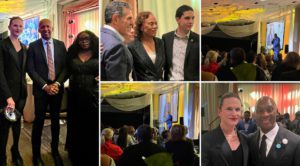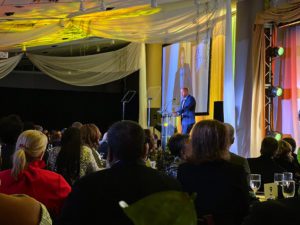Fighting for Transformational Ideas - Muhammad Ali Humanitarian Awards 2024
Saturday’s Muhammad Ali Humanitarian Awards were a reminder of the powerful, transformational, hope-filled work happening across the globe that reflects Ali’s 6 core principles of Spirituality, Conviction, Confidence, Dedication, Giving, and Respect.
The event couldn’t have been more timely, as we think about the future of our country, and our role in continuing to work for racial justice, healing, liberation, and equity. The international group of young leaders they celebrated as part of the program, including founders from Bangladesh and Nairobi, demonstrated how insights gleaned through lived experience, paired with determination and ingenuity can impact the lives of millions of people. They represent bright spots as we look at how younger generations will shape the future.

To close out the evening, we heard from Shaquille O’Neal, who was honored as Humanitarian of the Year, and Bryan Stevenson of Equal Justice Initiative, who was honored with a Lifetime Achievement Award. Their messages embodied Ali’s ethos, “Impossible is just a word thrown around by small men who find it easier to live in the world they’ve been given than to explore the power they have to change it. Impossible is not a fact. It’s an opinion. Impossible is potential. Impossible is temporary. Impossible is nothing.”
From the podium, Shaquille O’Neal said, “You know, Ali wasn’t only a fighter in the ring, he was a fighter for justice, compassion and a humanitarian. Muhammad Ali set an example for generations by using his platform to stand up for what he believed in. He had the courage to walk the walk even when it was unpopular. He personified the saying, ‘With great power comes great responsibility,’ and he showed us that we all have the duty to make a difference.”
Next, Bryan Stevenson talked about his ancestors, and how their lives shaped who he is and the work he does. Before the ceremony, we were able to talk to Stevenson about (Un)Known Project, and to share our gratitude for how his work in Montgomery, AL through the National Memorial for Peace & Justice and the Legacy Museum inspired the work we are doing today! This included seeing the columns of documented lynchings in Kentucky inscribed with “unknown” when Hannah went for the first time, and wondering how these people’s names could be unknown and lost to history.

“Every time he [Ali] fought, my entire extended family, people all over the community would come together, and I loved those nights because we were all sitting together, rooting for him to win, not just a fight, but a step forward for many of us who felt marginalized and excluded, disfavored, ignored, mistreated,” Stevenson said. “That was the greatness of his career and his identity. He did more than fight boxing matches. He fought for these ideas that were so transformational.”
He went on to share that, “On the first day of law school, I didn’t tell you why I’m really in law school, and I feel the need to tell you now. And, what I told them is that I’m in law school because my great grandfather was enslaved in Caroline County, Virginia, and as a teenager, while he was enslaved, he had a hope of freedom so powerful that he learned to read. In the 1850’s it wasn’t a rational hope to believe that you’d be free. He didn’t know a civil war was coming a decade later, but he had this hope of freedom, and he learned to read… And after emancipation, my grandmother told me that once a week, my great grandfather would stand on the porch of their home, and he would read the newspaper to formerly enslaved people who didn’t know how to read, because he wanted them to know what was going on… when I got to Harvard Law School, I realized I got there because I was standing on the shoulders of 10 million people who were enslaved in the country, and many of the enslaved had this hope of freedom that allowed them, that pushed them to survive. We don’t talk enough about the other side of slavery, the trauma, the abuse, the humiliation, the degradation it was all around us. But the other part of slavery is that our enslaved foreparents found a way to love in the midst of agony, they found a way to create generations of people who could do something that they couldn’t do, and because of their hope for freedom.”
We left feeling renewed, inspired, and reminded of the power we – together – have to shape and imagine the world we want to live in. Thank you to Lonni Ali, Ali Center President and CEO DeVone Holt, and the Ali Center team for hosting such an amazing event, and thank you to Nicole Yates for including us in the evening.
In hope and justice,
Josh Miller & Hannah Drake, (Un)Known Project co-founders
